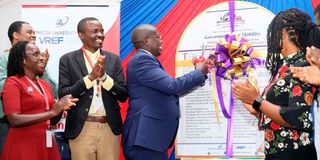Premium
African researchers meet in Kenya to find solutions for transport woes

From left: MID-UTA Programme lead Dr Gladys Nyachieo, Redeemer's University Ede in Nigeria Associate Professor Department of Transport Management Dr Adeniyi Oluwakoya, Multimedia University Council Chairman Dr Albert Kochei and Dr Hilla Limann Technical University in Ghana lecturer Fidelma Ibili launch Making and Implementing Decisions in Transport in Sub-Saharan Africa workshop at Multimedia University in Nairobi on April 3, 2025.
Researchers mostly drawn from Africa converged in Nairobi on Thursday to find a lasting solution to the governance of transport menace in the continent to find a solution through a well-thought-out plan.
The researchers drawn from Kenya, Ghana, Nigeria, Uganda, the UK, Switzerland, as well as government agencies, transport authorities, and NGOs, converged at the Multimedia University of Kenya to examine how transport-related decisions are made and implemented, with specific focus on paratransit, public transport, and walking in the region.
The three-year research programme funded by Volvo Research and Education Foundation (VREF) at a tune of over Sh761 million is set to address critical questions that have hindered effective transport in the continent.
Among the questions that the scholars are seeking to unravel include: who are the actors involved in urban transport decision-making and implementation, how do they influence and shape the decisions from inception to implementation, and what enablers and barriers do they experience, and how do they overcome them.
The researchers are expected to come up with policy recommendations and transport governance capacity-building programmes in sub-Saharan African cities.
Through the research, the individuals are seeking to reshape the future of urban mobility governance in Sub-Saharan Africa by encouraging transport systems that are designed to serve all urban residents equitably and sustainably.
The team will be led by Dr Gladys Nyachieo, a lecturer at the Multimedia University of Kenya, with a consortium of experts from Kenya, Ghana, Nigeria, Uganda, and the UK.

Making and Implementing Decisions in Transport in Sub-Saharan Africa programme lead Dr. Gladys Nyachieo speaks during the workshop launch at Multimedia University in Nairobi on April 3, 2025.
Dr Nyachieo says that by linking governance reforms to structured decision-making and implementation, urban mobility governance can be transformed into a more efficient, inclusive, and sustainable system.
“There is a need for integrated transport systems, enhanced public transport services, and infrastructure investments that prioritize sustainability and accessibility. Therefore, strengthening transport governance in Africa requires transparent decision-making, informed policies, and stakeholder collaboration,” Dr Nyachieo said.
According to Dr Nyachieo, evidence-based recommendations will improve transport planning, and a knowledge hub will facilitate continuous learning, ensuring sustainable, efficient mobility systems that drive economic growth and enhance urban transport governance.
“By linking governance reforms to structured decision-making and implementation, urban mobility governance can be transformed into a more efficient, inclusive, and sustainable system,” Dr Nyachieo said.
She pointed out that effective urban mobility governance is crucial for economic growth and business development in Africa as reliable and efficient transport systems reduce logistical costs, enhance accessibility to markets, and improve labour mobility.
“Well-governed urban mobility fosters investment boosts productivity, and supports small and medium enterprises by facilitating the movement of goods and people. Additionally, sustainable mobility solutions attract international investors and contribute to the overall competitiveness of African cities,” Dr Nyachieo said.
The research entails studying how informal transport operates, the governance frameworks that regulate it, and the factors influencing policy decisions, analysing the decision-making processes behind investments in Bus Rapid Transit (BRT) and rail systems, and their integration into existing transport networks.
Other areas include investigating the role of pedestrian infrastructure in urban transport, decision-making challenges in walkability policies, and the link between walking, public transport, and paratransit.
The research has been informed by the fact that many African cities struggle with transport systems that are inefficient, unsafe, and poorly integrated.

From left: MID-UTA Programme lead Dr Gladys Nyachieo, Redeemer's University Ede in Nigeria Associate Professor Department of Transport Management Dr Adeniyi oluwakoya, Multimedia University Council Chairman Dr Albert Kochei and Dr Hilla Limann Technical University in Ghana Lecturer Fidelma Ibili launch the Making and Implementing Decisions in Transport in Sub-Saharan Africa workshop at Multimedia University in Nairobi on April 3, 2025.
It seeks to address governance gaps by examining decision-making structures by providing insights that can help streamline transport policy and planning.
The findings will guide policymakers in designing inclusive, sustainable transport systems that balance informal and formal transport services.
According to the World Health Organization’s (WHO) report released in February 2025, no country within the African continent has laws that meet the best practice standards for the five key road safety behavioural risk factors, which include speeding, drink driving, non-use of motorcycle helmets, seatbelts and child restraints.
In another report, titled a Fare Price: An Investigation into the Health Costs of Motorcycle Taxi Crashes in Kenya, one in every three Kenyans who died in road accidents over the past six years was either riding on a motorcycle or was hit by a motorcycle.
This points to a glaring gap in the lack of sustainable transport policies across many countries in sub-Saharan Africa.
Sub-Saharan Africa (SSA) is experiencing rapid urbanization, leading to increased demand for efficient, sustainable, and equitable urban transport systems.
However, decision-making and governance in urban mobility remain fragmented, often influenced by politics, power dynamics, and institutional constraints.
While cities worldwide are transitioning toward formalized public transport systems, many African cities continue to rely on paratransit—privately owned, informal transport modes such as matatus, boda bodas, trotros, and okadas—which serve as the backbone of urban mobility.





